do-does的用法和练习题
- 格式:doc
- 大小:32.00 KB
- 文档页数:2
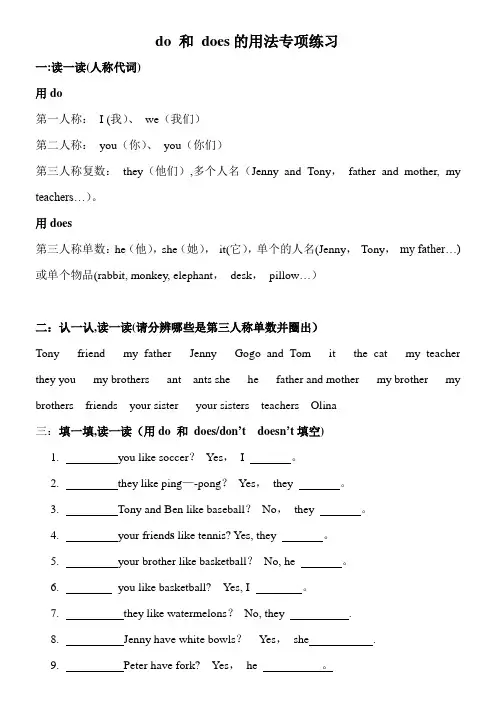
do 和does的用法专项练习一:读一读(人称代词)用do第一人称:I (我)、we(我们)第二人称:you(你)、you(你们)第三人称复数:they(他们),多个人名(Jenny and Tony,father and mother, my teachers…)。
用does第三人称单数:he(他),she(她),it(它),单个的人名(Jenny,Tony,my father…)或单个物品(rabbit, monkey, elephant,desk,pillow…)二:认一认,读一读(请分辨哪些是第三人称单数并圈出)Tony friend my father Jenny Gogo and Tom it the cat my teacher they you my brothers ant ants she he father and mother my brother my brothers friends your sister your sisters teachers Olina三:填一填,读一读(用do 和does/don’t doesn’t填空)1.you like soccer?Yes,I 。
2.they like ping—-pong?Yes,they 。
3.Tony and Ben like baseball?No,they 。
4.your friend s like tennis? Yes, they 。
5.your brother like basketball?No, he 。
6.you like basketball? Yes, I 。
7.they like watermelons?No, they .8.Jenny have white bowls?Yes,she .9.Peter have fork? Yes,he 。
10.your father like apples? Yes,he 。
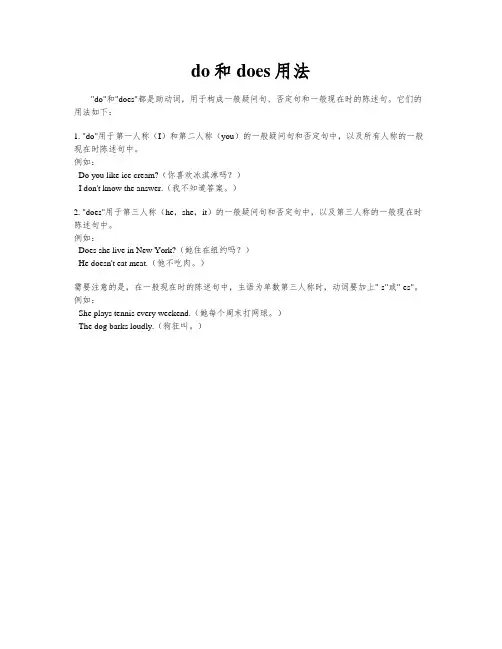
do和does用法
"do"和"does"都是助动词,用于构成一般疑问句、否定句和一般现在时的陈述句。
它们的用法如下:
1. "do"用于第一人称(I)和第二人称(you)的一般疑问句和否定句中,以及所有人称的一般现在时陈述句中。
例如:
- Do you like ice cream?(你喜欢冰淇淋吗?)
- I don't know the answer.(我不知道答案。
)
2. "does"用于第三人称(he,she,it)的一般疑问句和否定句中,以及第三人称的一般现在时陈述句中。
例如:
- Does she live in New York?(她住在纽约吗?)
- He doesn't eat meat.(他不吃肉。
)
需要注意的是,在一般现在时的陈述句中,主语为单数第三人称时,动词要加上"-s"或"-es"。
例如:
- She plays tennis every weekend.(她每个周末打网球。
)
- The dog barks loudly.(狗狂叫。
)。
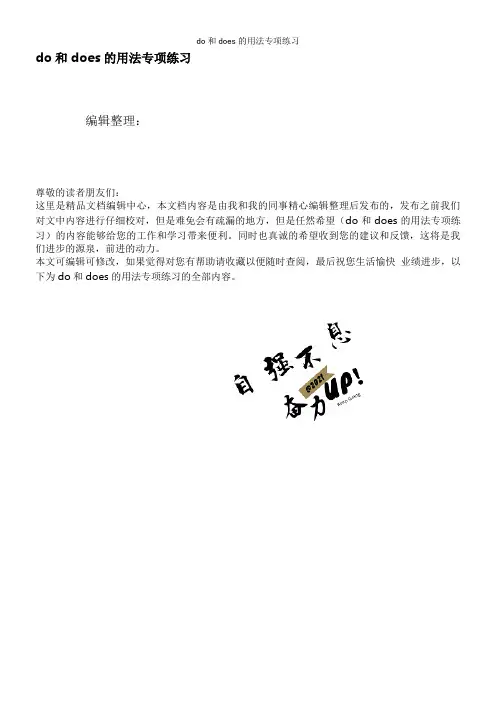
do和does的用法专项练习编辑整理:尊敬的读者朋友们:这里是精品文档编辑中心,本文档内容是由我和我的同事精心编辑整理后发布的,发布之前我们对文中内容进行仔细校对,但是难免会有疏漏的地方,但是任然希望(do和does的用法专项练习)的内容能够给您的工作和学习带来便利。
同时也真诚的希望收到您的建议和反馈,这将是我们进步的源泉,前进的动力。
本文可编辑可修改,如果觉得对您有帮助请收藏以便随时查阅,最后祝您生活愉快业绩进步,以下为do和does的用法专项练习的全部内容。
do 和 does的用法专项练习一:读一读(人称代词)用do第一人称: I (我)、 we(我们)第二人称: you(你)、 you(你们)第三人称复数: they(他们),多个人名(Jenny and Tony, father and mother,my teachers…)。
用does第三人称单数:he(他),she(她), it(它),单个的人名(Jenny, Tony,my father…)或单个物品(rabbit, monkey, elephant,desk, pillow…)二:认一认,读一读(请分辨哪些是第三人称单数并圈出)Tony friend my father Jenny Gogo and Tom it the cat my teacher they you my brothers ant ants she he father and mother my brother my brothers friends your sister your sisters teachers Olina三:填一填,读一读(用do 和does/don't doesn’t填空)1. you like soccer? Yes, I 。
2. they like ping—-pong? Yes, they .3. Tony and Ben like baseball? No, they 。
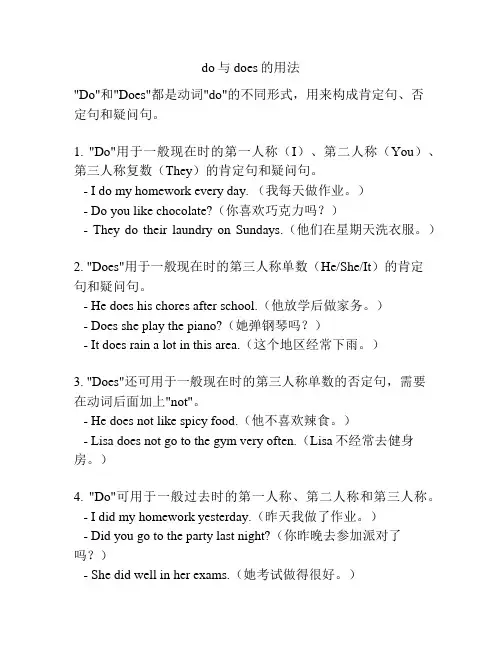
do与does的用法"Do"和"Does"都是动词"do"的不同形式,用来构成肯定句、否定句和疑问句。
1. "Do"用于一般现在时的第一人称(I)、第二人称(You)、第三人称复数(They)的肯定句和疑问句。
- I do my homework every day. (我每天做作业。
)- Do you like chocolate?(你喜欢巧克力吗?)- They do their laundry on Sundays.(他们在星期天洗衣服。
)2. "Does"用于一般现在时的第三人称单数(He/She/It)的肯定句和疑问句。
- He does his chores after school.(他放学后做家务。
)- Does she play the piano?(她弹钢琴吗?)- It does rain a lot in this area.(这个地区经常下雨。
)3. "Does"还可用于一般现在时的第三人称单数的否定句,需要在动词后面加上"not"。
- He does not like spicy food.(他不喜欢辣食。
)- Lisa does not go to the gym very often.(Lisa不经常去健身房。
)4. "Do"可用于一般过去时的第一人称、第二人称和第三人称。
- I did my homework yesterday.(昨天我做了作业。
)- Did you go to the party last night?(你昨晚去参加派对了吗?)- She did well in her exams.(她考试做得很好。
)需要注意的是,"do"和"does"在肯定句中通常只起强调的作用,意味着动作发生或现实存在。
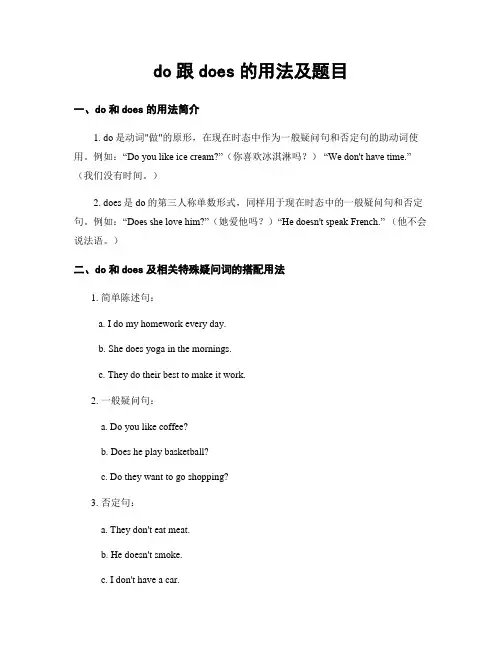
do跟does的用法及题目一、do和does的用法简介1. do是动词"做"的原形,在现在时态中作为一般疑问句和否定句的助动词使用。
例如:“Do you like ice cream?”(你喜欢冰淇淋吗?)“We don't have time.”(我们没有时间。
)2. does是do的第三人称单数形式,同样用于现在时态中的一般疑问句和否定句。
例如:“Does she love him?”(她爱他吗?)“He doesn't speak French.” (他不会说法语。
)二、do和does及相关特殊疑问词的搭配用法1. 简单陈述句:a. I do my homework every day.b. She does yoga in the mornings.c. They do their best to make it work.2. 一般疑问句:a. Do you like coffee?b. Does he play basketball?c. Do they want to go shopping?3. 否定句:a. They don't eat meat.b. He doesn't smoke.c. I don't have a car.4. 特殊疑问词who, what, when, where, why等与do或does搭配使用,用于提出特殊问题。
a. Who does the cooking in your family?b. What do you usually do on weekends?c. When does the train arrive?三、do和does的替代形式1. 在一般疑问句中,可以使用缩略形式do和does的替代形式,即'do not'变为don't,'does not'变为doesn't。
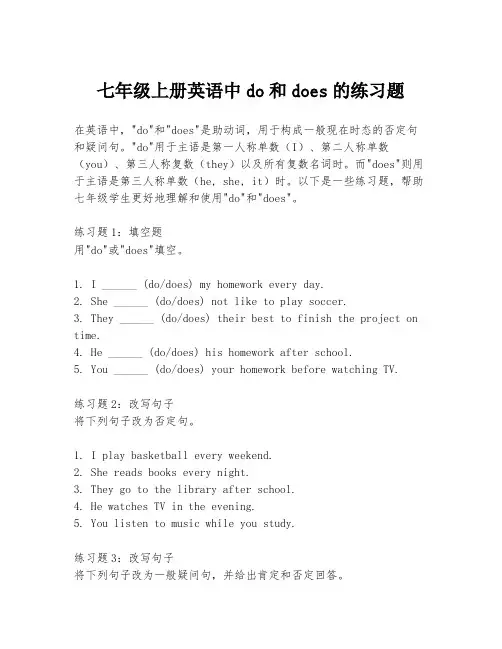
七年级上册英语中do和does的练习题在英语中,"do"和"does"是助动词,用于构成一般现在时态的否定句和疑问句。
"do"用于主语是第一人称单数(I)、第二人称单数(you)、第三人称复数(they)以及所有复数名词时。
而"does"则用于主语是第三人称单数(he, she, it)时。
以下是一些练习题,帮助七年级学生更好地理解和使用"do"和"does"。
练习题1:填空题用"do"或"does"填空。
1. I ______ (do/does) my homework every day.2. She ______ (do/does) not like to play soccer.3. They ______ (do/does) their best to finish the project on time.4. He ______ (do/does) his homework after school.5. You ______ (do/does) your homework before watching TV.练习题2:改写句子将下列句子改为否定句。
1. I play basketball every weekend.2. She reads books every night.3. They go to the library after school.4. He watches TV in the evening.5. You listen to music while you study.练习题3:改写句子将下列句子改为一般疑问句,并给出肯定和否定回答。
1. I play the piano.- Does she play the piano?- Yes, ______ ______.- No, ______ ______.2. You watch movies on weekends.- ______ you watch movies on weekends?- Yes, ______ ______.- No, ______ ______.3. They study English at school.- ______ they study English at school?- Yes, ______ ______.- No, ______ ______.4. He goes to the gym every morning.- ______ he go to the gym every morning?- Yes, ______ ______.- No, ______ ______.5. She swims in the pool.- ______ she swim in the pool?- Yes, ______ ______.- No, ______ ______.练习题4:完成对话根据上下文完成对话。
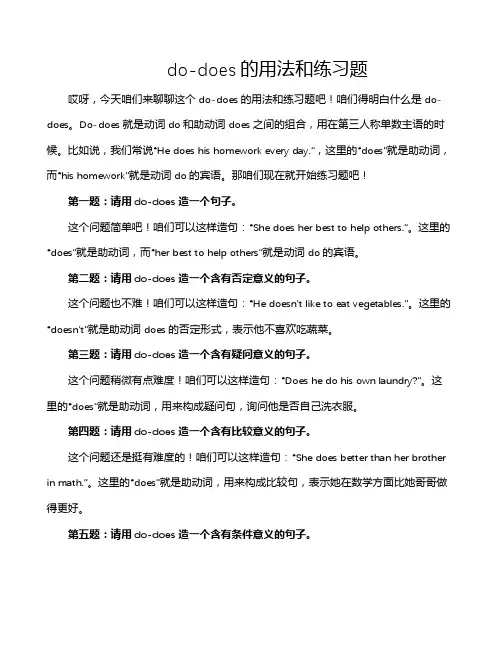
do-does的用法和练习题哎呀,今天咱们来聊聊这个do-does的用法和练习题吧!咱们得明白什么是do-does。
Do-does就是动词do和助动词does之间的组合,用在第三人称单数主语的时候。
比如说,我们常说“He does his homework every day.”,这里的“does”就是助动词,而“his homework”就是动词do的宾语。
那咱们现在就开始练习题吧!第一题:请用do-does造一个句子。
这个问题简单吧!咱们可以这样造句:“She does her best to help others.”。
这里的“does”就是助动词,而“her best to help others”就是动词do的宾语。
第二题:请用do-does造一个含有否定意义的句子。
这个问题也不难!咱们可以这样造句:“He doesn't like to eat vegetables.”。
这里的“doesn't”就是助动词does的否定形式,表示他不喜欢吃蔬菜。
第三题:请用do-does造一个含有疑问意义的句子。
这个问题稍微有点难度!咱们可以这样造句:“Does he do his own laundry?”。
这里的“does”就是助动词,用来构成疑问句,询问他是否自己洗衣服。
第四题:请用do-does造一个含有比较意义的句子。
这个问题还是挺有难度的!咱们可以这样造句:“She does better than her brother in math.”。
这里的“does”就是助动词,用来构成比较句,表示她在数学方面比她哥哥做得更好。
第五题:请用do-does造一个含有条件意义的句子。
这个问题还是挺有难度的!咱们可以这样造句:“If you do your homework carefully, you will get good grades.”。
这里的“do”就是动词原形,而“carefully”则是副词修饰它,表示如果你认真做作业,就会得到好成绩。
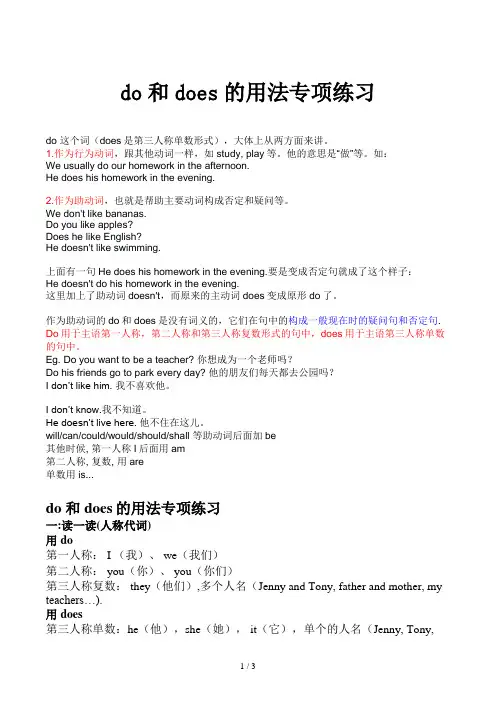
do和does的用法专项练习do 这个词(does是第三人称单数形式),大体上从两方面来讲。
1.作为行为动词,跟其他动词一样,如study, play等。
他的意思是“做”等。
如:We usually do our homework in the afternoon.He does his homework in the evening.2.作为助动词,也就是帮助主要动词构成否定和疑问等。
We don't like bananas.Do you like apples?Does he like English?He doesn't like swimming.上面有一句He does his homework in the evening.要是变成否定句就成了这个样子:He doesn't do his homework in the evening.这里加上了助动词doesn't,而原来的主动词does变成原形do了。
作为助动词的do和does是没有词义的,它们在句中的构成一般现在时的疑问句和否定句. Do用于主语第一人称,第二人称和第三人称复数形式的句中,does用于主语第三人称单数的句中。
Eg. Do you want to be a teacher? 你想成为一个老师吗?Do his friends go to park every day? 他的朋友们每天都去公园吗?I don’t like him. 我不喜欢他。
I don’t know.我不知道。
He doesn’t live here. 他不住在这儿。
will/can/could/would/should/shall 等助动词后面加be其他时候, 第一人称I后面用am第二人称, 复数, 用are单数用is...do 和 does的用法专项练习一:读一读(人称代词)用do第一人称: I (我)、 we(我们)第二人称: you(你)、 you(你们)第三人称复数: they(他们),多个人名(Jenny and Tony, father and mother, my teachers…).用does第三人称单数:he(他),she(她), it(它),单个的人名(Jenny, Tony,my father…)或单个物品(rabbit, monkey, elephant, desk, pillow…)二:认一认,读一读(请分辨哪些是第三人称单数并圈出)Tony friend my father Jenny Gogo and Tom it the cat my teacher they you my brothers ant ants she he father and mother my brother my brothers friends your sister your sisters teachers Olina三:填一填,读一读(用do 和 does/don’t doesn’t填空)1. you like soccer? Yes, I .2. they like ping--pong? Yes, they .3. Tony and Ben like baseball? No, they .4. your friend s like tennis? Yes, they .5. your brother like basketball? No, he .6. you like basketball? Yes, I .7. they like watermelons? No, they .8. Jenny have white bowls? Yes, she .9. Peter have fork? Yes, he .10. your father like apples? Yes, he .11. your friend s like bananas? No, they .12. your father and mother have spoons ? Yes, they .四:造一造,读一读(仿例造句)you, soccer/yes---Do you like soccer? Yes, I do.1.they, lamp/no----2.your brothers, oranges/no3.the monkeys,bananas/ yes4.Tony and Gogo, cherries/yes5. you, watermelons/yes6. I, grapes/no7.She, skirt/yes8.your brother, tennis/no9.Tony, basketball/ yes10.her sister, pants/no五:译一译,读一读(将中文翻译成英文)1.你喜欢香蕉吗?是的,我喜欢。
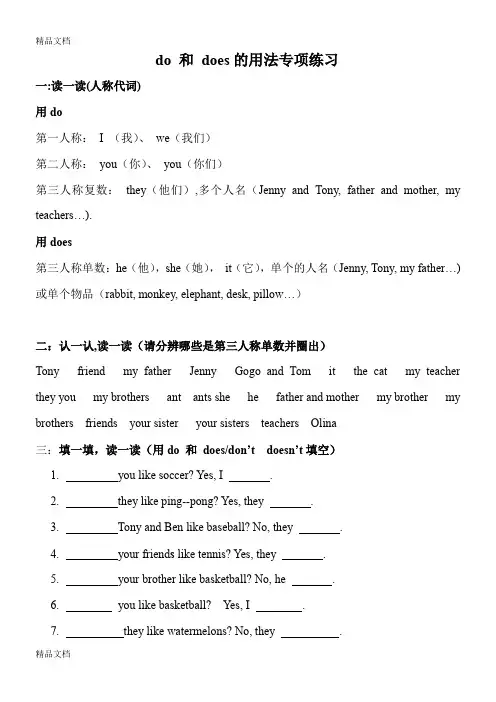
do 和does的用法专项练习一:读一读(人称代词)用do第一人称:I (我)、we(我们)第二人称:you(你)、you(你们)第三人称复数:they(他们),多个人名(Jenny and Tony, father and mother, my teachers…).用does第三人称单数:he(他),she(她),it(它),单个的人名(Jenny, Tony, my father…)或单个物品(rabbit, monkey, elephant, desk, pillow…)二:认一认,读一读(请分辨哪些是第三人称单数并圈出)Tony friend my father Jenny Gogo and Tom it the cat my teacher they you my brothers ant ants she he father and mother my brother my brothers friends your sister your sisters teachers Olina三:填一填,读一读(用do 和does/don’t doesn’t填空)1.you like soccer? Yes, I .2.they like ping--pong? Yes, they .3.Tony and Ben like baseball? No, they .4.your friend s like tennis? Yes, they .5.your brother like basketball? No, he .6.you like basketball? Yes, I .7.they like watermelons? No, they .8.Jenny have white bowls? Yes, she .9.Peter have fork? Yes, he .10.your father like apples? Yes, he .11.your friend s like bananas? No, they .12.your father and mother have spoons ? Yes, they . 四:造一造,读一读(仿例造句)you, soccer/yes---Do you like soccer? Yes, I do.1.they, lamp/no----2.your brothers, oranges/no3.the monkeys,bananas/ yes4.Tony and Gogo, cherries/yes5. you, watermelons/yes6. I, grapes/no7.She, skirt/yes8.your brother, tennis/no9.Tony, basketball/ yes一般现在时练习题1. We often___________(play) in the playgound.2. He _________(get) up at six o’clock.3. __________you _________(brush) your teeth every morning?4. What (do) he usually (do) after school?5. Danny (study) English,Chinese,Maths,Science and Art at school.6. Mike sometimes __________(go) to the park with his sister.7. At eight at night, she __________(watch) TV with his parents.8. ________ Mike________(read) English every day?9. How many lessons_________your classmate________(have) on Monday?10. What time_________his mother_________(do) the housework?改句子1. Do you often play football after school? (肯定回答)2. I have many books. (改为否定句)3. Gao Shan’s sister likes playing table tennis (改为否定句)4. She lives in a small town near New York. (改为一般疑问句)5. I watch TV every day. (改为一般疑问句)6. David has a goal. (改为一般疑问句)7. We have four lessons.(否定句)8. Nancy doesn’t run fast (肯定句)9. My dog runs fast.。
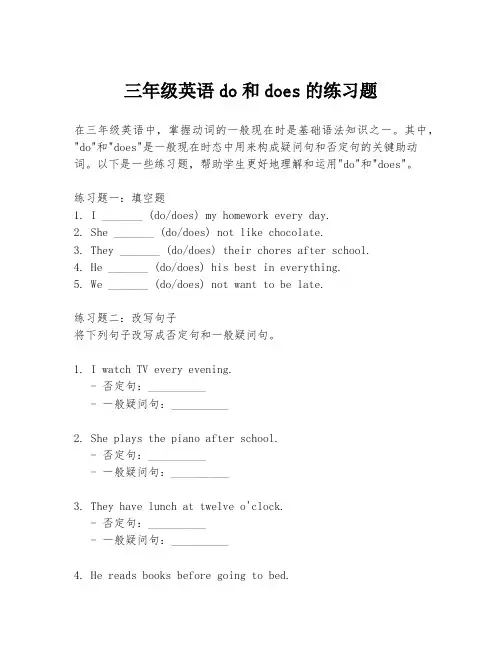
三年级英语do和does的练习题在三年级英语中,掌握动词的一般现在时是基础语法知识之一。
其中,"do"和"does"是一般现在时态中用来构成疑问句和否定句的关键助动词。
以下是一些练习题,帮助学生更好地理解和运用"do"和"does"。
练习题一:填空题1. I _______ (do/does) my homework every day.2. She _______ (do/does) not like chocolate.3. They _______ (do/does) their chores after school.4. He _______ (do/does) his best in everything.5. We _______ (do/does) not want to be late.练习题二:改写句子将下列句子改写成否定句和一般疑问句。
1. I watch TV every evening.- 否定句:__________- 一般疑问句:__________2. She plays the piano after school.- 否定句:__________- 一般疑问句:__________3. They have lunch at twelve o'clock.- 否定句:__________- 一般疑问句:__________4. He reads books before going to bed.- 否定句:__________- 一般疑问句:__________5. We go to the park on weekends.- 否定句:__________- 一般疑问句:__________练习题三:选择正确的形式从括号中选择正确的形式填空。
1. My sister (does/does not) like to swim in the pool.2. The cat (does/does not) sleep on the sofa.3. We (do/does) enjoy playing soccer.4. He (does/do) not want to go to the party.5. They (do/does) love to eat ice cream.练习题四:完成对话根据对话内容,选择正确的助动词填空。
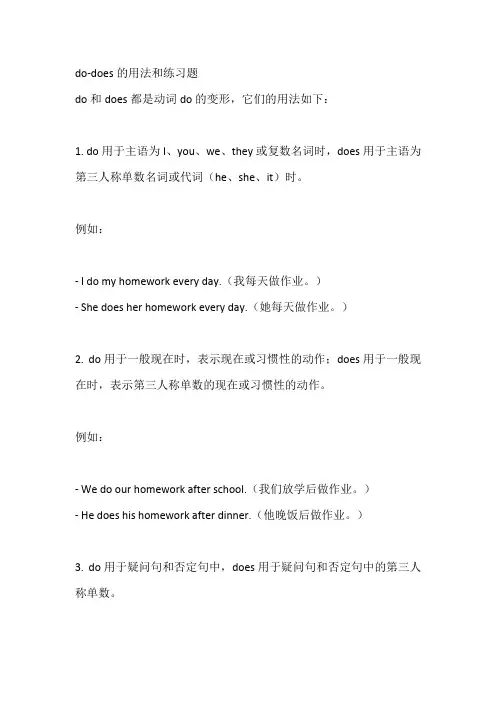
do-does的用法和练习题do和does都是动词do的变形,它们的用法如下:1. do用于主语为I、you、we、they或复数名词时,does用于主语为第三人称单数名词或代词(he、she、it)时。
例如:- I do my homework every day.(我每天做作业。
)- She does her homework every day.(她每天做作业。
)2. do用于一般现在时,表示现在或习惯性的动作;does用于一般现在时,表示第三人称单数的现在或习惯性的动作。
例如:- We do our homework after school.(我们放学后做作业。
)- He does his homework after dinner.(他晚饭后做作业。
)3. do用于疑问句和否定句中,does用于疑问句和否定句中的第三人称单数。
- Do you like ice cream?(你喜欢冰淇淋吗?)- Does she like ice cream?(她喜欢冰淇淋吗?)- I don't like ice cream.(我不喜欢冰淇淋。
)- She doesn't like ice cream.(她不喜欢冰淇淋。
)以下是一些练习题:1. _______ you like pizza?A. DoB. Does2. My sister _______ her homework every day.A. doB. does3. _______ they play basketball on weekends?A. Do4. He _______ his teeth before going to bed.A. doB. does5. _______ your parents speak English?A. DoB. Does答案:1. A2. B3. A4. B5. B。
助动词do/does的用法专题助动词do与does口诀(一)(do ) 变句型,先观察,述句中动用原, 一般疑问do提前,否定don’t 实动前。
(二)(does) 若是主语为三单,述句中动变形,一般疑问也简单,does放在句子前,否定doesn’t实动前,主动出现动还原。
总结:含有实义动词的句子,进行句子转换时应借助于助动词do/does,主语是三单(he,she,it)时用does,其他用do。
否定句在动词原形前加don’t /doesn’t,一般疑问句把do/does 提前,特殊疑问句由特殊疑问词+一般疑问句。
句子类型及结构肯定句:主语+动词+其它。
主语是三单,动词用三单I like this blue sweater. Tom likes this blue sweater.我喜欢这件蓝色的毛衣。
Tom喜欢这件蓝色的毛衣。
Tom likes English.Tom喜欢英语。
I like this blue sweater.Tom likes English.否定句:主+ don’t/doesn’t+动原+其它I don’t like this blue sweater.我不喜欢这件蓝色的毛衣。
Tom doesn’t like English.Tom不喜欢英语。
I like this blue sweater.Tom likes English.一般疑问句:do/does提前,其它照抄不变(Do /Does+主+动原+其它?),一人称变二人称。
回答:Yes,主+do/does. No,主+ don’t/doesn’t.Do you like this blue sweater?Yes, I do. / No, I don’t.你喜欢这件蓝色的毛衣吗?是的,我喜欢; 不,我不喜欢。
Does Tom like English?Yes,he does. /No.he doesn’t.Tom喜欢英语吗?是的,他喜欢;不,他不喜欢。
do 和does的用法专项练习一、在一般现在时中,动词do做为助动词无词义,只是帮助一般现在时构成否定句,一般疑问句;作为实义动词,其词义是“做、干”的意思。
二、动词does是动词do的第三人称单数形式。
一般现在时主语是第三人称单数,动词和助动词都用does。
三、切记助动词do和does出现,实义动词用原形。
一:读一读(人称代词)用do第一人称:I (我)、we(我们)第二人称:you(你)、you(你们)第三人称复数:they(他们),多个人名(Jenny and Tony, father and mother, my teachers…).用does第三人称单数:he(他),she(她),it(它),单个的人名(Jenny, Tony, my father…)或单个物品(monkey, elephant, desk, …)一.找朋友。
do doesHe I she we it you theyJack and Tom a dog二.选词填空。
1. [Do/Does]______ he watch TV at night? Yes, he .2. [Do/Does]______ you go to school everyday? No, I .3. [Do/Does]______ Jack and Peter like apples?4. [Do/Does]______ Tina go swimming on Sunday?5. [Do/Does]______they play football? Yes, they _ __[do/does]6. [Do/Does]______ we have a good teacher? Yes, we ___ _[do/does]7. [Do/Does]_____ they jump rope ? No, they _ __[do not/does not].8. [Do/Does]_____your dog walk in the zoo?9. [Do/Does]____ I have a big nose? No, you _____[do not/does not]10. [Do/Does]____ your cats eat fish? Yes, they _____.[do/does].二:认一认,读一读(请分辨哪些是第三人称单数并圈出)Tony friend my father Jenny Gogo and Tom it the cat my teacher they you my brothers ant ants she he father and mother my brother my brothers friends your sister your sisters teachers三:填一填,读一读(用do 和does/don’t doesn’t填空)1.you like soccer? Yes, I .2.they like ping--pong? Yes, they .3.Tony and Ben like baseball? No, they .4.your friend s like tennis? Yes, they .5.your brother like basketball? No, he .6.you like basketball? Yes, I .7.they like watermelons? No, they .8.Jenny have white bowls? Yes, she .9.Peter have fork? Yes, he .10.your father like apples? Yes, he .11.your friend s like bananas? No, they .12.your father and mother have spoons ? Yes, they .四:造一造,读一读(仿例造句)you, soccer/yes---Do you like soccer? Yes, I do.1.they, juce/no----2.your brothers, oranges/no3.the monkeys,bananas/ yes4.Tony and Gogo, apples/yes5. you, watermelons/yes6. I, milk/no7.She, skirt/yes8.your brother, tea/no9.Tony, basketball/ yes10.her sister, water/no。
do和does的练习题在英语中,"do"和"does"是助动词,用于构成疑问句和否定句。
"do"用于主语是第一人称单数(I, we),第二人称单数(you),所有人称的复数(you, we, they),以及第三人称单数(he, she, it)的一般现在时态。
而"does"则用于第三人称单数(he, she, it)的一般现在时态。
以下是一些练习题,帮助学生更好地掌握"do"和"does"的用法。
练习一:填空题1. I _______ (do/does) my homework every day.2. She _______ (do/does) not like to eat vegetables.3. They _______ (do/does) their best to finish the project on time.4. He _______ (do/does) his homework after school.5. We _______ (do/does) not agree with the decision.练习二:转换句子将下列陈述句转换成一般疑问句,并给出肯定和否定回答。
6. She goes to the gym every morning.- Does she go to the gym every morning?- Yes, she does. / No, she doesn't.7. They watch TV in the evening.- _______ they _______ TV in the evening?- _______, _______ _______. / _______, _______ _______.8. I read books before going to bed.- _______ you _______ books before going to bed?- _______, _______ _______. / _______, _______ _______.9. He plays soccer on weekends.- _______ he _______ soccer on weekends?- _______, _______ _______. / _______, _______ _______.10. We speak English at work.- _______ you _______ English at work?- _______, _______ _______. / _______, _______ _______.练习三:错误纠正找出下列句子中的错误,并进行纠正。
do和does的用法do 这个词(does是第三人称单数形式),大体上从两方面来讲。
1.作为行为动词,跟其他动词一样,如study,play等。
他的意思是“做”等.如:We usually do our homework in the afternoon.He does his homework in the evening.2。
作为助动词,也就是帮助主要动词构成否定和疑问等。
We don’t like bananas.Do you like apples?Does he like English?He doesn't like swimming.上面有一句He does his homework in the evening。
要是变成否定句就成了这个样子:He doesn't do his homework in the evening。
这里加上了助动词doesn’t,而原来的主动词does变成原形do了.作为助动词的do和does是没有词义的,它们在句中的构成一般现在时的疑问句和否定句。
Do用于主语第一人称,第二人称和第三人称复数形式的句中,does用于主语第三人称单数的句中. Eg。
Do you want to be a teacher?你想成为一个老师吗?Do his friends go to park every day? 他的朋友们每天都去公园吗?I don't like him. 我不喜欢他.Where does Tom come from?汤姆来自哪里?I don’t know。
我不知道。
He doesn’t live here. 他不住在这儿。
will/can/could/would/should/shall 等助动词后面加be其他时候, 第一人称I后面用am第二人称, 复数,用are单数用is。
..do 和does的用法专项练习一:读一读(人称代词)用do第一人称: I (我)、we(我们)第二人称:you(你)、you(你们)第三人称复数:they(他们),多个人名(Jenny and Tony,father and mother,my teachers…).用does第三人称单数:he(他),she(她),it(它),单个的人名(Jenny, Tony, my father…)或单个物品(rabbit,monkey, elephant,desk, pillow…)二:认一认,读一读(请分辨哪些是第三人称单数并圈出)Tony friend my father Jenny Gogo and Tom it the cat my teacher they you my brothers ant ants she he father and mother my brother my brothers friends your sister your sisters teachers Olina三:填一填,读一读(用do 和does/don't doesn't填空)1.you like soccer?Yes, I .2.they like ping—-pong?Yes,they 。
do, does的用法
●do用于当主语是第一人称I, 第二人称you 及复数时(复数包括we, they, these, those及两个以上的人或者事物。
●does 用于当主语是第三人称单数时(第三人称包括she, he, it, this, that,单独的事物或者人名等)。
含有实义动词的句型结构变换
一、肯定陈述句
1.当主语是I, you及复数时,谓语动词用原型。
Eg. I know it. (Eg.表示例如的意思)
They have two volleyballs.
Tina and Tom like ice cream.
2. 当主语是第三人称单数时(第三人称包括she, he, it, this, that,单独的事物或者人名等)。
谓语动词要变为第三人称单数形式。
特别要注意have—has
Eg. She has a set of keys.
He knows my name.
Tom needs a computer game.
二、肯定陈述句变换成否定陈述句
1.当主语是I, you及复数时,在谓语动词前加do not don’t
Eg. I don’t know it.
They don’t have two volleyballs.
Tina and Tom don’t like ice cream.
2. 当主语是第三人称单数时,在谓语动词前加does not = doesn’t, 谓语动词打回原型
Eg. She doesn’t have a set of keys.
He doesn’t know my name.
Tom doesn’t need a computer game.
三、肯定陈述句变换成一般疑问句采用“一加二变三问号”。
一加:
当主语是I, you及复数时,在句子开头加do;
当主语是第三人称单数时(第三人称包括she, he, it, this, that,单独的事物或者人名等), 在句子开头加does;
二变:
变大小写;
第一人称变为第二人称(I / we变为you, my / our变为 your);当主语是第三人称单数时,谓语动词要打回原型。
三问号:
在句末加问号。
肯定回答;Yes, 主语 + do/ does.
否定回答:No, 主语+don’t / doesn’t . (主语要用相应的人称代词主格)
Eg. Do you know it? Yes, I do. / No, I don’t .
Do they have two volleyballs? Yes, they do. / No, they don’t .
Do Tina and Tom like ice cream? Yes, they do. / No, they don’t.
Does she have a set of keys? Yes, she does. / No, she doesn’t.
Does he know your name? Yes, he does. /No, he doesn’t.
四、肯定陈述句变换成特殊疑问句(对画线部分提问)特殊疑问词 + 一般疑问句?(去掉画线部分)
Eg. They have two volleyballs. ------------What do they have?
He knows my name. -------------What does he know?
Exercise1 :
把下列句子变成否定句,一般疑问句并做出肯否定回答,并对划线部分提问。
1.I know the answer.
否定句: I (know)the answer.
一般疑问句:you (know) he answer?
回答: ,I .
否定回答:, I .
对划线部分提问:
2 He plays soccer every day.
否定句: He (play) soccer every day.
一般疑问句:he (play) soccer every day?
肯定回答:, He .
否定回答:, He .
3.The books are on the teachers’ desk.
否定句: The books (be) on the teachers’ desk
对划线部分提问:are the books?
Exercise2
1.I go to Beijin(一般疑问句)
______ ______ __________ to Beijin?
2.We can see some birds.(一般疑问句)
______ ______ see __any_ birds?(any用在疑问句中,而some用在陈述句中) 3.He likes apples.(一般疑问句)
______ he ________ apples?
4.Here are some banana s on the teachers’ desk.(一般疑问句)
______ ______ ______ flowers on the teachers’ desk?
5.There are some apples on the tree.(否定句)
There ______ ______ __any__ apples on the tree.(any用在疑问句中,而some用在陈述句中)
6 he is very old.(否定句)
he ______ very old.
7. It is green.(否定句)
______ ______ green.
8.I have some hot dogs.热狗(一般疑问句)
_______ __you_ ______ __any_ __hot__ dogs ?.
11.My pencils are in the pencil-box.(对划线部分提问)
______ ______ your pencils。